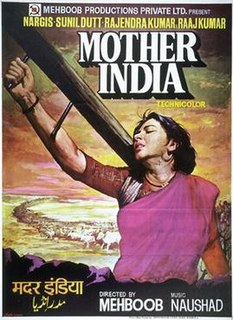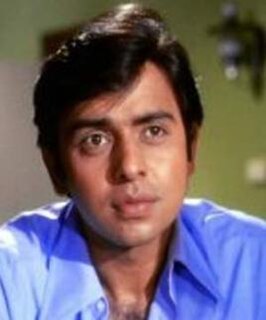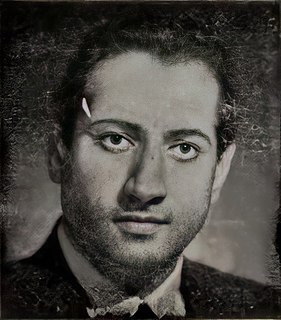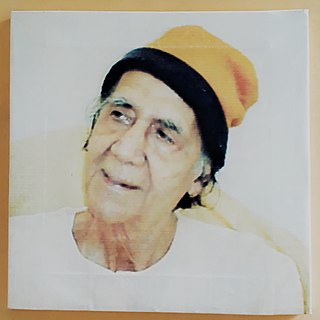Related Research Articles

Mother India is a 1957 Indian epic drama film, directed by Mehboob Khan and starring Nargis, Raaj Kumar, Rajendra Kumar and Sunil Dutt. A remake of Khan's earlier film Aurat (1940), it is the story of a poverty-stricken village woman named Radha (Nargis), who in the absence of her husband, struggles to raise her sons and survive against a cunning money-lender amidst many troubles.

Mehboob Khan was a pioneer producer-director of Indian cinema, best known for directing the social epic Mother India (1957), which won the Filmfare Awards for Best Film and Best Director, two National Film Awards, and was a nominee for the Academy Award for Best Foreign Language Film. He set up his production company – Mehboob Productions, and later a film studio – Mehboob Studios in Bandra, Mumbai in 1954. He also created the dacoit film genre with Aurat (1940) and Mother India, and is also known for other blockbusters including the romantic drama Andaz (1949), the swashbuckling musical Aan (1951), and the melodrama Amar (1954).

Rashid Jahan was an Indian writer and medical doctor known for her Urdu literature and trenchant social commentaries. She wrote short stories and plays and contributed to Angarey (1932), a collection of unconventional short stories written in collaboration with Sajjad Zaheer, Ahmed Ali, and Mahmuduz Zafar.
Dina Pathak was an Indian actress and director of Gujarati theatre and also a film actor. She was an activist and President of the National Federation of Indian Women (NFIW).

Vinod Mehra was an Indian actor in Indian films. He started out as a child actor in the late 1950s before starting his film career as an adult in 1971. He acted in over 100 films from the 1970s through to his death at the age of 45 in 1990. He was also the producer and director of the film Gurudev which was released 3 years after his death.

Wajahat Hussain Mirza Changezi was an Indian screenwriter and film director who penned the dialogues of some of the most successful films in India during the 1950s and 1960s, best known for Mughal-e-Azam (1960) and the Academy Award-nominee, Mother India (1957).
Aurat may refer to:

Aurat, also known by its English title Woman, is a 1940 Indian film directed by Mehboob Khan and starring Sardar Akhtar, Surendra, Yakub, Kanhaiyalal and Arun Kumar Ahuja. The film's music is by Anil Biswas and dialogue is by Wajahat Mirza. Mehboob Khan later remade this film as Mother India (1957), which is considered one of the biggest hits of all time in Indian Cinema. The film was hit at the box-office.
Zakhmi Aurat is a 1988 Indian Hindi movie starring Dimple Kapadia and Raj Babbar and directed by Avtar Bhogal. Kapadia played Kiran Dutt, a police officer who is subject to gang rape and, when the judicial system fails to convict the criminals, unites with other rape victims to castrate the rapists in revenge. A financial success, the film opened to a polarised reaction from critics and further attracted wide coverage for its lengthy and brutal rape scene involving Kapadia. Khalid Mohammed of The Times of India noted Kapadia's "power packed performance" but criticised the rape sequence as "utter lasciviousness" and "vulgarity spattering through the screen". Feminist magazine Manushi panned its low cinematic quality, including the absurdity of the action scenes and the "ugly kind of titillation" in the rape scene, but believed it "stays closer to women's experience" than other films of its sort; the review was particularly approving of Kapadia's work: "What really carries the film through is Dimple Kapadia's performance—low key, moving and charming without being at all clinging or seductive. She brings a conviction to her role that is rare among Bombay heroines." In later years, The Times of India labelled it a "B-grade movie" though it noted Kapadia's convincing portrayal of "anguish and bitterness at being denied justice". M.L. Dhawan from The Tribune, while documenting the famous Hindi films of 1988, praised Kapadia for "proving her mettle as an actress of intensity and passion." Subhash Jha, however, wrote in 2002 that its box-office outcome notwithstanding, Zakhmi Aurat "turned into quite an embarrassment for its leading lady".

Subramaniam Srinivasan, popularly known by his screen name S. S. Vasan, was an Indian journalist, writer, advertiser, film producer, director and business tycoon. He is the founder of the Tamil-language magazine Ananda Vikatan and the film production company Gemini Studios, Gemini Film Laboratories and Gemini Picture Circuit. He was a member of parliament from 1964 and served his term till his death.

Abdur Rashid Kardar (1904–1989) was an Indian film actor, director and producer. He is credited with establishing the film industry in the Bhati Gate locality of Lahore, British India.

Kanhaiyalal was an Indian actor who acted in 105 films in his career, primarily in Hindi films produced in Bollywood, the Mumbai-based film industry.
Faredoon A. Irani was an Indian cinematographer who worked in Hindi films. He shot Mehboob Khan's films Andaz (1949), Aan (1952) and Mother India (1958).

Makarand Dave, also referred as Sai Makarand Dave, was a Gujarati poet and author from Gujarat, India.
Ek Hi Raasta is a 1939 Hindi social film directed by Mehboob Khan. The director of photography was Faredoon Irani with story by Babubhai A. Mehta and Wajahat Mirza. The film was produced by Sagar Movietone. The cast included Arun Kumar Ahuja, Sheikh Mukhtar, Anuradha, Kanhaiyalal and Harish. This was the debut film of Sheikh Mukhtar who went on to act and direct several successful films. and Arun Kumar Ahuja, a prominent actor in the 1940s. Ek Hi Raasta is a film about wrongs of society and its laws, and one of the early Hindi films to make a noticeable application of WW II.

Bahen is a 1941 Hindi film directed by Mehboob Khan. Sagar Movietone had closed down during the start of WW II and reformed as National Studios. It was under the new banner that Mehboob Khan produced his three important films of that time, Aurat (1940), Bahen (1941) and Roti (1942). Written by Babubhai Mehta and Zia Sarhadi, it had dialogues and screenplay by Wajahat Mirza. The cinematography was by Faredoon Irani. Anil Biswas was the music director with lyrics by Safdar Aah. The cast included Sheikh Mukhtar, Nalini Jaywant, Harish, Kanhaiyalal, Husn Bano, Swaroop Rani, Baby Meena and Bhudo Advani.

Arun Kumar Ahuja, popularly known as Aroon, was an Indian actor and producer who was active in Hindi cinema in the 1940s and early 1950s, appearing in over 30 films in both leading and supporting roles. He was perhaps best known for appearing in Mehboob Khan's 1940 film Aurat which was the predecessor of the Oscar nominated 1957 remake Mother India. He was married to singer and actress Nirmala Devi and is the father of actor Govinda.

Sardar Akhtar (1915–1986) was an Indian actress who worked in Hindi and Urdu films. She started her acting career on the Urdu stage. Her early films were with Saroj Movietone, where she did a majority of stunt (action) roles. She came into prominence as the washer-woman in the role of Rami Dhoban in Sohrab Modi's Pukar (1939). As a woman seeking justice for the death of her husband, it was a breakthrough role for her. A popular song she sang in the film was "Kaheko Mohe Chhede". Her career defining role was as a "peasant woman" deserted by her husband, in Mehboob Khan's Aurat (1940), a role later made famous by Nargis in Mehboob's remake Mother India.

Sagar Movietone also Sagar Films, Sagar Film Company and Sagar Productions was an Indian film production company involved in the making of films for Indian cinema. It was launched by Ardeshir Irani with Chimanlal Desai and Dr. Ambalal Patel in 1929 in Bombay, Maharashtra, India. Sagar was initially started as a branch company of Ardeshir's Imperial Film Company. Several key figures from Imperial, such as Mehboob Khan were shifted to Sagar. The studio was in operation from 1930 to 1939. In 1940, it combined with General Pictures to form National Studios. It made "Parsi theatre based films, mythologicals and stunt movies". Sagar fostered the career of many artists who rose to prominence. Early directors such as Prafulla Ghosh, Sarvottam Badami, Ezra Mir and Nanubhai Vakil were promoted by the company. Mehboob Khan got his first break as a director in Al Hilal in 1935. He was referred to as "the most important alumnus" from Sagar, who went on to become one of Indian cinema's "most influential film-makers".
Babubhai is a given name. Notable people with the name include:
References
- ↑ Chatterjee, Gayatri (2002). Mother India . British Film Institute. p. 12. ISBN 978-0-85170-917-8.